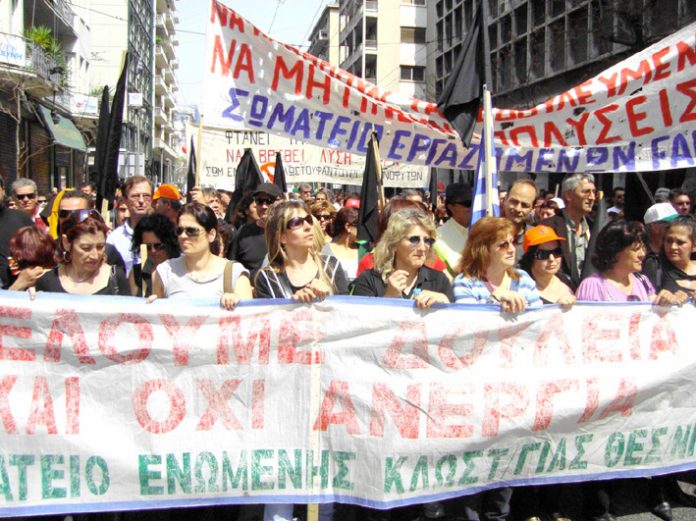TENS of thousands of Greek workers from all industries and services took part last Thursday in the rallies and demonstrations staged in the capital Athens and in every city and town as part of the 24-hour general strike called by the GSEE (Greek TUC) against the policies of the right-wing Karamanlis government.
Hundreds of thousands participated in the strike; GSEE reported high percentages in the public sector, banks, transport, ports, post-office, media and engineering industries.
In the large cities most department stores remained shut. No ship sailed out of the Piraeus port. Not a single newspaper was printed and the strike was solid in news agencies, radio and TV stations who broadcast only pre-recorded programmes.
The majority of civil servants stayed away from work and a high percentage of schools stayed closed. But the strike was less successful in large factories and in heavy industries and mines.
In Athens there were three mass demonstrations organised by the GSEE, the PAME (Greek Communist Party’s trades unions section) and a third by trades unions and left wing organisations.
The GSEE leaders who spoke at the rally demanded that ‘those who created the crisis must pay for it’, the very words of the President of the Greek Republic K Papoulias spoken at his meeting with the GSEE early this week.
At the front of the GSEE march, which was made up in the main by large contingents of electricity, transport and public sector workers, hundreds of United Textiles workers shouted anti-government slogans and waved black flags.
These workers, mostly women, had travelled from the north of Greece, where the 14 factories of the United Textiles are located, to Athens and for four days have set up camp outside the building of the Finance Ministry.
The President of the textile workers’ trade union Ilias Charisis told News Line that the Finance Minister is demanding the sacking of 950 workers out of a total workforce of 1,200, in order to approve a ‘survival plan’ for United Textiles.
‘We are not giving up,’ Charisis said, ‘next time we are going to occupy the Finance Ministry.’
The Greek Communist Party (KKE) have refused to support the struggle of the United Textile workers claiming that they are being misguided by the GSEE bureaucrats.
But, like the GSEE leaders, the Stalinist leadership of the KKE are totally opposed to calls for the occupation of the United Textiles factories and the nationalisation of the company without compensation and under workers control and management.
The Greek Trotskyists of the Revolutionary Marxist League campaigned in the marches with their leaflet calling for the overthrow of the Karamanlis government and for a workers and farmers socialist government to replace capitalism.
Earlier in the week, on Tuesday, hundreds of textiles workers of the United Textiles Industries, the biggest in Greece, have set up camp outside the Finance Ministry building in central Athens demanding the payment of their wages.
A meeting of union representatives and the General Secretary of the Ministry produced no results and workers marched through Athens carrying black flags behind their head banner stating ‘we want jobs not unemployment’.
United Textiles have worked closely with the leaders of the GSEE (Greek TUC) and have produced a ‘survival plan’ for the company, through bank loans, based on mass redundancies, reduced wages and ‘flexible’ working conditions.
The union have agreed on this but workers are split between those supporting the ‘survival’ plan and those, backed by the Federation of Textile Industry Workers, who say that they must fight for their jobs rejecting redundancies and ‘flexibility’.
But the Federation, dominated by Communist Party trade unionists, refused to even discuss the calls for the occupation of the United Textiles plants and the nationalisation of the company under workers’ control and management.
